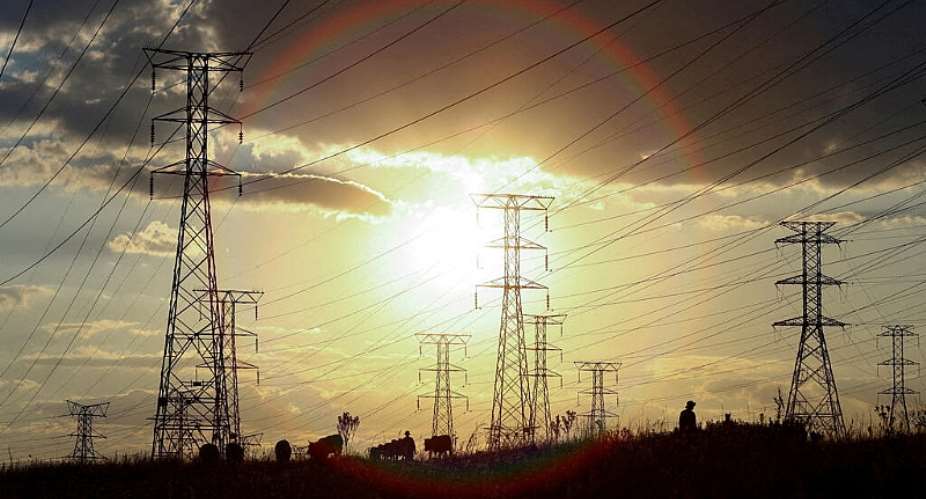Power cuts in South Africa have intensified with the most industrialised state on the continent having to cut electricity for six hours every day. Anger is mounting over the sweeping measures, caused by failures at ageing and poorly maintained infrastructure.
Andre de Ruyter, the boss of state-owned Eskom, announced a series of planned outages in the coming week.
Urging South Africans to use electricity sparingly, he called for office lights to be turned off at night, and for swimming pool pumps and water heaters to be turned off during peak hours.
"If everyone plays their role we can manage demand," De Ruyter told journalists.
Developing efficient large-scale generation capacity "will take time", the CEO added.
People woke up on Sunday to news of "stage 6" power cuts which equates to six hours without electricity per day. A difficult situation considering it is winter in the country. The loadshedding is scheduled throughout the day by instalments of two to four hours depending on the area.
Anger
The chief operating officer of Eskom, Jan Oberholzer, said in a press briefing on Sunday that it is uncertain at this point "as to when we will be able to ease the current stage of load shedding".
Although the company later tweeted that there is a possibility "loadshedding will be reduced to stage 5 at midnight" on Monday.
Aaliyah Dhoodad, a 37-year-old accountant from Cape Town, is as incensed by this situation as are most South Africans.
"It is ridiculous. We've never had it so bad," she told RFI. "This affects all aspects of our daily life like heating, cooking, washing, watching TV. Power surges are also blowing up our electrical appliances.
"Working from home has become a challenge, laptop batteries won't last, wifi is down".
Street hawkers told local media the measure is crippling their businesses. They have to work additional hours in order to prepare the food they sell according to when electricity is on. Many say it is not viable.
Eskom in crisis
Eskom, is struggling to meet electricity demand because its old and poorly maintained coal-fired power stations continually break down.
It explained that the breakdown of five generating units on 16 and 17 September, with a combined capacity of 2,400MW, necessitated the escalation of loadshedding.
Energy expert, Ted Blom, told eNCA news channel that mismanagement is one of the root causes of the problem.
"After Andre de Ruyter took office [as Eskom's CEO], he cut the maintenance budget and boast about earlier repayment of Eskom's loans of over 2 billion rands. Up till 2001, Eskom was rated as one of the top utilities in the world," he says.
South Africa had years of experience generating surplus energy that was sold to neighbouring countries.
"You've got to be an exceptional genius to turn the top utility in the world into the poor state that Eskom is in now," added Blom.
De Ruyter warned of high levels of loadshedding expected for the week.
"It is necessary to escalate the loadshedding to stop the use of the emergency generation reserves and begin replenishing them," Eskom explains.
However, day-to-day measures to deal with power cuts are not accessible to all South Africans.
"I invested in an UPS to power supply my wifi so as to be able to work," Aaliyah Dhoodad said. "Also switching to gas stoves and heaters has now become essential.
"Although solar power is becoming increasingly popular in the country, the majority of people can't afford the costly investments or live in buildings with no option of solar power."
A long wait
South Africa's President Cyril Ramaphosa is cutting short his overseas trip and will head back to South Africa immediately after Queen Elizabeth II's state funeral on Monday.
"The President will no longer be travelling to New York [for the United Nations General Assembly] from London. Instead, he will head home to deal with current Stage 6 load shedding," said Presidency spokesperson Vincent Ngwenya.
President Ramaphosa announced steps in July to encourage private power generation to supplement supply from renewable sources.
Eskom has warned that these plans may not deliver results for the next 12 months or so.
South Africa produces 80 percent of its electricity from coal, creating serious pollution, environmentalists say.
The country obtained €7.7 billion for its energy transition during the COP26 climate change conference in Glasgow last year.





 There’s nothing you can do for us; just give us electricity to save our collapsi...
There’s nothing you can do for us; just give us electricity to save our collapsi...
 Ghanaian media failing in watchdog duties — Sulemana Braimah
Ghanaian media failing in watchdog duties — Sulemana Braimah
 On any scale, Mahama can't match Bawumia — NPP Youth Organiser
On any scale, Mahama can't match Bawumia — NPP Youth Organiser
 Never tag me as an NPP pastor; I'm 'pained' the 'Akyem Mafia' are still in charg...
Never tag me as an NPP pastor; I'm 'pained' the 'Akyem Mafia' are still in charg...
 Your refusal to dedicate a project to Atta Mills means you never loved him — Kok...
Your refusal to dedicate a project to Atta Mills means you never loved him — Kok...
 2024 elections: I'm competent, not just a dreamer; vote for me — Alan
2024 elections: I'm competent, not just a dreamer; vote for me — Alan
 2024 elections: Forget NPP, NDC; I've the Holy Spirit backing me and nothing wil...
2024 elections: Forget NPP, NDC; I've the Holy Spirit backing me and nothing wil...
 2024 elections: We've no trust in judiciary; we'll ensure ballots are well secur...
2024 elections: We've no trust in judiciary; we'll ensure ballots are well secur...
 Performance tracker: Fire MCEs, DCEs who document Mahama's projects; they're not...
Performance tracker: Fire MCEs, DCEs who document Mahama's projects; they're not...
 Train crash: Railway ministry shares footage of incident
Train crash: Railway ministry shares footage of incident
